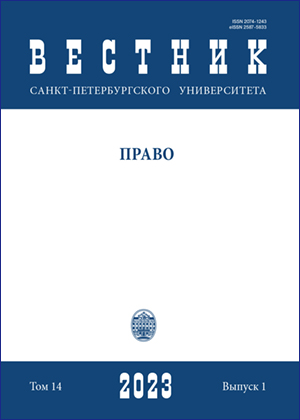Computer games in legal research: On the prerequisites of the regulation model
DOI:
https://doi.org/10.21638/spbu14.2023.101Abstract
Games in general and computer games in particular have long been a subject of research in legal research starting from the focus on the analogy between law and games (known inter alia from the works by A. Ross). However, by the beginning of the 21st century computer games and, above all, multiplayer computer games (virtual worlds) became an independent subject of legal research, both because of the interest in private legal problems and based on the methodological premise in the spirit of L. Lessig, according to which the study of the legal dimension of multiplayer game worlds, just as it was earlier with the Internet, can provide new knowledge about the law in general. Computer games are a commercially successful type of media, reflecting the acute problems of “digital law” and one of the significant theoretical and legal problems of determining the reasonable limits of law intervention in “non-serious” or “virtual” relationships. To understand the peculiarities of computer games, including for the purposes of legal research and improvement of the model of legal regulation, a broad interdisciplinary view that takes into account the approaches developed in media studies (M. McLuhan, L. Manovich et al.) and in studies of games as such (J. Huizinga and R. Caillois et al.). As a result, computer games can be considered as a kind of new media the qualities of which are reflected in their main legal qualifications — as the results of intellectual activity, information, means of communication and, actually, games. These qualities can be considered as basic for the development of the model of regulation of computer games and the game industry, taking into account the balance of interests of developers, publishers and the game community, as well as taking into account national interests.
Keywords:
computer games, videogames, mediaphilosophy, legal regulation, intellectual property, digital law, virtual worlds, metaverses
Downloads
References
Downloads
Published
How to Cite
Issue
Section
License
Articles of "Vestnik of Saint Petersburg University. Law" are open access distributed under the terms of the License Agreement with Saint Petersburg State University, which permits to the authors unrestricted distribution and self-archiving free of charge.






